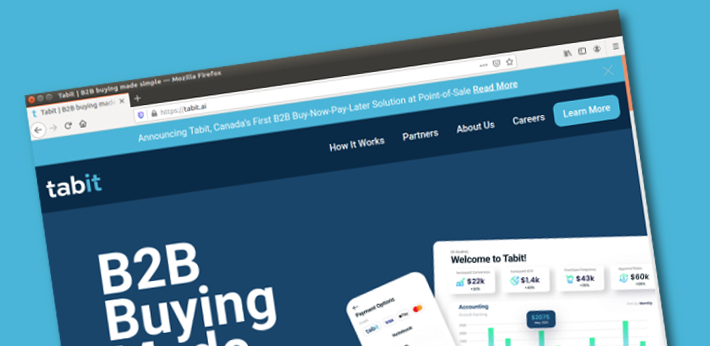Canada
Have You Heard of Jeeves?
July 6, 2022 Founded in 2020, the expense management platform Jeeves, recently won the Small-Medium Sized Business Lender Award from the Canadian Lenders’ Association. Jeeves is a Y-combinator company providing financial services internationally, and with their recent success the company has been able to operate in 24 countries.
Founded in 2020, the expense management platform Jeeves, recently won the Small-Medium Sized Business Lender Award from the Canadian Lenders’ Association. Jeeves is a Y-combinator company providing financial services internationally, and with their recent success the company has been able to operate in 24 countries.
“I think the number one thing that all of us at Jeeves would agree on is that we intently listen to our clients, we understand that we try to understand the pain points and therefore try to match those pain points or client demands to work with our skill sets,” said William Lam, Jeeves General Manager of North America.
Lam oversees the market activities for the US and Canada. An expense management platform, which the company labels its product as, is essentially a platform used to track expenses. Compared to platforms like QuickBooks, Jeeves integrates with the software rather than competes against it.
“We focus on providing financial services, not accounting software, for international startups and fast-growing companies. We are excited to continue to enhance the Jeeves platform and integrate with more accounting software in the near future,” said Lam.
According to the Dictionary, the term Jeeves is defined as a butler or valet which resonates with the behavior that the company tries to model.
“We want to remind ourselves, that we need to be providing the type of services and products that our clients need, and nothing beats a happy client. And therefore, we came up with that name, Jeeves, and that’s the mode of writing that our CEO and founder has been living on a daily basis with the rest of his team,” said Lam.
During Covid many businesses suffered tremendously in Canada, but for Jeeves it helped the company to grow and expand.
“For us as a company, as a FinTech company, that aspires to provide financial services globally, I think the pandemic fueled growth, and we’re experiencing like 900% growth since our Series B,” he said.
For loans, Jeeves focuses on corporate card solutions which upon approval allows clients to get funds in 48 hours and can be paid back in 12 monthly payments.
“So specifically, we launched our growth capital products as of just last month in June. Growth capital is a non-diluted revenue-based financing that’s very suitable for a lot of SaaS businesses specifically, and the clients are able to get the loans,” said Lam.
Lam believes there is still a lot of work to be done to complete the vision of becoming a global finance company with hopes of launching in more countries, more products, and more news to share.
“We service a lot of the small businesses as far as like unicorns, or unicorn startups, we’re very proud of the achievement so far. But I think that this is just the beginning,” he said.
Business Loan Seekers Likely to Consider Numerous Options, Study Says
April 25, 2022 New data published in the annual FinTech Lending Study published by Smarter Loans revealed that 40% of business loan seekers compare more than six options.
New data published in the annual FinTech Lending Study published by Smarter Loans revealed that 40% of business loan seekers compare more than six options.
Though this study focused on the Canadian market, it may partially explain a finding in the US, that more small business owners seeking capital are seeking out a merchant cash advance as a potential option than ever more. (A Federal Reserve study said that 10% of SMB capital seekers sought a merchant cash advance in 2021). That would make sense if business owners are obsessively applying to multiple sources for the sake of making more comparisons.
But even while they shop, they might not always be satisfied with what they learn, nor the outcome. Smarter Loans reported that only 60% of business loan seekers felt informed about their options while 40% of business owners that went forward with a business loan were not satisfied with their loan provider.
When examining both the business loan and consumer loan market, Smarter Loans says that loan seekers are more likely to receive their funds the same day they apply than ever before. (53% of those surveyed received funds within 24 hours of applying.)
Click here To view the full 2022 FinTech Lending Study published by Smarter Loans.
Canadian Fintech Continues to Soar as Open Banking Comes to Fruition
April 5, 2022
After seemingly endless deliberation, Canadian open banking is finally being implemented; a huge win for the already high-performing fintechs that call Canada home.
After overcoming laws that prevented access to the data that fintechs need to innovate, the Department of Finance in Canada named Abraham Tachjian as the open banking lead as of last week, in another legitimate step towards incorporating open banking within their legacy financial institutions.
This comes on top of Canadian fintech’s major impact both in Canada and abroad. Canadian companies in the space of lending, payments, banking, and crypto have been some of the best performing and most innovative companies around the world, despite not being able to leverage open banking in their innovation strategies within Canada until now.
In a release from the Canadian government, Randy Boissonnault, the Minister of Tourism and Associate Minister of Finance, commented broadly on open banking’s implementation of the new system.
“Canadians deserve a secure open banking system that is regulated, efficient, and protects their personal information,” said Boissonnault. “This is an important next step in the process of implementing the Advisory Committee’s recommendations, in order to convene stakeholders to design and implement the foundational elements of an open banking system that benefits both Canadians and businesses.”
As the laws are being put in place, Canadian fintech continues to soar. According to a recent LinkedIn post from Tal Schwartz, Senior Project Manager at Noomis Solutions and formerly of the Canadian Lenders Association, Canadian banking and fintech continues to lead the way globally.
In all the niches in finance, Canadian companies seem to have their name on the top of list. Corporate card companies like Jeeves is now with over $2B, Canadian Venture Capitalist firm Portage Ventures is one of the world’s largest with $4B in assets.
Online stock trading platform Questrade Financial Group has begun to offer mortgages. Their competitor Wealthsimple, another Canadian stock trading platform, has also said that mortgages are on the way alongside a big push into lending.
In the US, Canadian-giant TD Bank became the 6th largest bank in the states with recent acquisitions of First Horizon Bank in late February.
Apart from the success of companies themselves, a sign that the Canadian fintech space is doing well is a desire to reconnect in person. The CLA’s Leaders in Lending Summit was recently announced for mid-November, a gathering of a sector of Canadian finance whose future was doubted after pandemic-induced restrictions on their industry. deBanked reporters will be attendees of the event.
Why is Canadian Fintech Sizzling?
March 1, 2022 Downtown Montreal
Downtown MontrealIn recent weeks, Canadian fintech companies have made major splashes in the world market. In the sphere of acquisitions, lending, funding, products and even digital assets, multiple Canadian cities and the companies that call them home have gained a reputation for being a focal point in fintech progression. Cities like Vancouver, Toronto, and Montreal have become start-up hotspots for companies looking to ride the wave of Canadian financial innovation.
In the country’s most internationally impacting financial move, Montreal-based payments company Mobeewave’s acquisition by Apple is set to come to fruition, as the company is about to take their phone-to-POS mobile merchant terminal live around the world. Apple acquired Mobeewave last year for $100M and will use the company’s technology to allow merchants and customers to conduct payment transactions by touching phones.
Other companies of note are Hopper, the Montreal-based mobile travel agency that is embedding ‘travel fintech’ into their products. Things like insurance, price drop guarantees, and price freezing are now offered on the Hopper app, which is now valued over $5B after an influx of capital from Brookfield Asset Management.
BNPL giant Klarna has also made moves in the north, opening offices in both British Columbia and Quebec in an attempt to further their expansion into the Canadian market. In a recent interview, the company’s CEO said their research had found at least half of Canadian shoppers were a prime contender to get the best out of Klarna’s services.
So this all begs the question- Why is Canada so ripe for fintech?
“We’re a fast growing market with a strong immigration policy, cheaper technical talent, and strong government hiring incentives,” said Tal Schwartz, Senior Product Manager at Nomis Solutions. “Secondly, we’ve been successful at ‘Canadianizing’ global solutions. For example Brex and Ramp have no client presence here, but Caary and Float have successfully built homegrown solutions that fill a local need.”
Schwartz spoke further on Canadian companies putting their own improvements on established products, making ‘Canadianized’ versions of fintech products and ideas. “Revolut tried entering Canada with little success,” said Schwartz. “Now two years later Koho, Wealthsimple and Neo have cornered the digital banking market from within.”
 Even Canada’s legacy financial institutions have been challenged by fintech, as the nation with the notorious ‘Big Five Banks’ has seen neobanks creeping towards the top as the highest used, as the neobank dubbed Equitable Bank is now Canada’s 7th largest after acquiring Saskatoon-based Concentra Bank earlier this month. Equitable has newly grown its mortgage portfolio thanks to its partnership with Canadian fintech Nesto, a mortgage broker marketplace. The move also gives Equitable a footing in the credit union space, as Concentra provides treasury and trust services to over 200 credit unions in Canada.
Even Canada’s legacy financial institutions have been challenged by fintech, as the nation with the notorious ‘Big Five Banks’ has seen neobanks creeping towards the top as the highest used, as the neobank dubbed Equitable Bank is now Canada’s 7th largest after acquiring Saskatoon-based Concentra Bank earlier this month. Equitable has newly grown its mortgage portfolio thanks to its partnership with Canadian fintech Nesto, a mortgage broker marketplace. The move also gives Equitable a footing in the credit union space, as Concentra provides treasury and trust services to over 200 credit unions in Canada.
Even the metaverse has taken interest in what Canadian finance can offer it. Terra Zero, a Canadian metaverse real estate platform is now offering mortgages on Decentraland for those looking to purchase property in the trendiest space on the internet.
Canadian finance has made a big leap since a year ago. Pandemic-induced restrictions decimated the country’s financial fortitude, and international competition has never been more intense. Like Schwartz mentioned, it’s the ability for Canadian companies to innovate the innovators, using ideas stemming from other products to “Canadify’ fintech, that has surpassed their industry past the point of survival.
“I think Canadian fintech is hot right now because in Canada, we don’t have the alphabet-soup-level of federal bodies as the U.S. does, primarily leaving enforcement to smaller, more personal, more flexible provincial organizations,” said Nick Chandi, CEO of Forward AI, a Vancouver-based fintech. “In addition, Canada is set on Open Banking, with the Advisory Committee’s final report published in August 2021 and follow-up survey showing that the majority of the Canadian financial services industry wants to move ahead on implementing open banking in Canada ASAP.”
On top of financial friendly politics, Chandi believes it’s Canada’s concise population centers that breed collaboration and innovation. “It’s also a smaller community,” Chandi said. “With most fintech workers living in one of a few key cities, it’s easy to network and make things happen.”
Why a Small Business Finance Company Brought BNPL to B2B Transactions
February 27, 2022 Tabit, a subsidiary of Vancouver-based Merchant Growth, has rethought business financing by integrating a newly conceived consumer-based product, (Buy Now Pay Later) BNPL to the B2B transaction world. As a decade-old small business finance company, Merchant Growth’s launch of Tabit shows how alternative financiers from across North America are trying to find new financial products that serve tomorrow’s merchants.
Tabit, a subsidiary of Vancouver-based Merchant Growth, has rethought business financing by integrating a newly conceived consumer-based product, (Buy Now Pay Later) BNPL to the B2B transaction world. As a decade-old small business finance company, Merchant Growth’s launch of Tabit shows how alternative financiers from across North America are trying to find new financial products that serve tomorrow’s merchants.
According to David Gens, CEO and President of Merchant Growth, Merchant Growth’s steady business provides Tabit with the infrastructure, manpower, and underwriting capabilities it needs to develop this kind of unique financial product.
“At a Money 20/20 conference many years ago, a speaker made a comment that resonated with me,” said Gens, when asked about the origin ideas in Tabit’s development. “That speaker, I forgot who it was now, said that small business financial services share more similarities with consumer offerings than they do with the mid-market and commercial space. In other words, innovations that become successful in the consumer space end up translating over to small business.
“Ever since then I’ve taken that to heart and as we watched the explosive growth in the consumer BNPL space,” Gens continued. “We were constantly thinking about whether the timing is right to translate this over to B2B transactions.”
Gens also gave credit to his industry awareness, saying that he saw those on the international stage having similar ideas.
“In the past 12 to 24 months, we’ve also seen a number of announcements internationally of companies raising VC funds to do just this, but nobody has yet announced in Canada,” he said. “In our strategic planning meetings, we looked closely at our company’s capabilities and determined that we are well suited to build this.”
Tabit’s perceived advantage is that they can reinvent the lending space by not wrapping a financial product in a digital service like other techy lenders, but instead use relationships between businesses and their vendors in order to keep their cost of acquiring customers down, thus having the cost of financing cheaper for the borrower.

“Tabit is our answer for how to reach as many small businesses as possible in an economically sustainable way, therefore delivering a cost-competitive product,” said Gens. “That is by leveraging the relationships that B2B sellers have with their buyers, [and] it’s a great way to scale the delivery of SMB credit and provide significantly greater access to capital at competitive rates.”
Gens also touched on the idea of the need for new financial products to compete with innovation in lending. Despite recognizing the existence of digitally native merchants and the desire to incorporate tech into a financial product, Gens doesn’t seem to think there is a need to overhaul the market with experimental ideas.
“I think that the launch of Tabit is an embodiment of the trend of digital consumer experiences proliferating in the small business and B2B space,” said Gens. “[It] also speaks to the growing influence of digitally savvy and millennial business owners on SMB fintech offerings. Credit is fundamentally an old product that’s been around for thousands of years. It’s the way in which it is delivered and how and when that will continue to evolve.”
“It is also becoming increasingly dynamic and fluid with real-time data and machine learning models, creating unprecedented convenience as well as accuracy in pricing of risk, which drives accessibility,” Gens continued. “Innovation should remain focused on minimizing the friction and “number of clicks” for users of credit, freeing up time to be spent on other valuable activities.”
At the consumer level, BNPL has faced some scrutiny by both users and regulators. Credit being available at a moment’s whim at the point of sale, with limited time to decide on the consequences of taking on a financial product has had many people question the ethics and long term outlook on it. Gens however, is not one of those people.
“I struggle to see how low-interest point-of-sale financing can be considered predatory,” said Gens. “Such a product eases financial burdens, it does not increase them. Particularly in the B2B space where such an offering helps accelerate growth for small businesses, I am optimistic that regulators will perceive B2B BNPL payment solutions favorably.
Could Siri, Alexa, and Video be the New Frontier for Lenders?
January 25, 2022 The annual fintech study published by Smarter Loans revealed that 25% of respondents had used either Alexa, Siri, or another voice search to find information about financial services.
The annual fintech study published by Smarter Loans revealed that 25% of respondents had used either Alexa, Siri, or another voice search to find information about financial services.
Voice devices, it appears, are not only getting better at answering regular questions, but users are also getting more comfortable even asking them in the first place.
“Alexa, what is deBanked?” for example, returns an accurate reply despite our not having made any efforts to opt-in to the device’s knowledge base. Alexa just knows.
So why bother performing an old-fashioned Google search? Turns out, it’s becoming less common to do. Only 57% of respondents said they discovered the lender they applied with through online search. 13% said they discovered them through social media. 8% came from a friend’s recommendation. 15% found them through a well-regarded “Loan & Financial Directory” (Smarter Loans, who authored the study).
Once on a lender website, users had questions. 27% read online articles and reports, 37% read reviews, 16% called the company, and 9% consulted a friend or family member.
60% of respondents said informative videos about a company or its products would increase their confidence in that company. That could be key since 66% of respondents said that they researched more than 3 lenders before applying for a loan.
All of the respondents resided in Canada. 92% of respondents also said that they were satisfied or very satisfied with their loan provider.
Canada is Looking Forward to Open Banking
October 4, 2021 “It’s a fairly big deal,” said Tal Schwartz, Senior Advisor to the Canadian Lenders Association, when discussing the Canadian government’s renewed interest in alternative lenders after the recent Canadian election. As potential government officials from both parties discussed ideas about open banking in their election campaigns, such a conversation had been quelled by the “Big Five” Canadian banks— until now.
“It’s a fairly big deal,” said Tal Schwartz, Senior Advisor to the Canadian Lenders Association, when discussing the Canadian government’s renewed interest in alternative lenders after the recent Canadian election. As potential government officials from both parties discussed ideas about open banking in their election campaigns, such a conversation had been quelled by the “Big Five” Canadian banks— until now.
“The closer we get to some kind of entrenched regulatory framework, the better positions fintechs will be in to actually compete, get access to financial data, and raise money in an environment where there is regulatory certainty,” said Schwartz.
In August, the Canadian department of Finance welcomed a Final Report from the Advisory Committee on Open Banking that showcased a plan to modernize the Canadian financial regulatory system, with open banking and fintech in mind.
“Consumer-driven finance, or open banking, is already part of Canadians’ lives,” said Chrystia Freeland, Canada’s Deputy Prime Minister and Minister of Finance, in the report.
“Many use digital services every day to manage their money, to budget for expenses, and to make investments. Working towards a regulated, made-in-Canada system will make sure that we continue to enjoy a strong, stable, and innovative financial sector that is globally competitive, promotes consumer choice, prioritizes data privacy, and contributes to economic growth,” Freeland continued.
Schwartz said that the traditional oligopolistic structure of Canadian banking can offer advantages in times of financial crisis, but not when the government is shelling out money to help businesses during pandemic-related shutdowns.
 “The reality was, if you’re a small business, you don’t have a credit relationship with a big bank, the only credit relationship you have is with an alternate lender,” said Schwartz. “By distributing money through big banks, in one sense, you’re not servicing customers the way they want to be served, and you’re cutting oxygen to a flourishing part of the innovation economy in Canada.”
“The reality was, if you’re a small business, you don’t have a credit relationship with a big bank, the only credit relationship you have is with an alternate lender,” said Schwartz. “By distributing money through big banks, in one sense, you’re not servicing customers the way they want to be served, and you’re cutting oxygen to a flourishing part of the innovation economy in Canada.”
Unlike in the United States, the Canadian government gave exclusive access of allocation to pandemic-induced federal assistance loans to the Big Five banks, leaving small business lenders relatively out to dry during that time. When asked about what issues he would like to see the new administration tackle first when it comes to alternative lenders, Schwartz mentioned the allocation of this type of money moving forward.
Other institutions outside of big banking in Canada are making strides in their effort to compete. Fintech giant Stripe announced hiring sprees for their new Toronto office last Thursday. Then there’s Nuula, a startup that aims to build a user-centric financial super app, announcing $120M in funding in early September.
To reach its full potential, Canadian fintech companies need the access to more data. The report recognizes the acknowledgement of the necessity this data is to fintech companies. “The scope of Canada’s open banking system in its initial phase should include data that is currently available to consumers and small business through their online banking applications,” it says. “Financial institutions should be allowed to exclude derived data – described as data enhanced by financial institutions to provide additional value to their consumers, such as internal credit risk assessments” the report reads.
“Historically, there hasn’t been very tech friendly or [Big Bank] challenger friendly regulations,” Schwartz said. “This is really the first time we’ve seen the political parties even mention issues of open banking and saying this will be a priority for our next government.”
“This has given the industry a lot of hope,” said Schwartz.
Loans Canada Announces Online Lending Survey Results
August 9, 2021 Loans Canada published their annual online lending survey results on Monday morning. The company polled online personal loan applicants throughout Canada.
Loans Canada published their annual online lending survey results on Monday morning. The company polled online personal loan applicants throughout Canada.
Among the results, several statistics stand out.
40.8% of respondents said that they felt “pressured” to fill their loan application quickly, a compelling counter to the mainstream narrative that borrowers are demanding speed.
44.8% of respondents said they felt “pressured” to accept credit building services even though 85.3% of applicants that had been rejected for an online personal loan said they had been rejected on the basis that their credit score was too low.
Loans Canada noted large swaths of satisfaction and dissatisfaction alike, finding that applicants that have never been able to get approved for an online personal loan were highly likely to rank the online borrowing experience as “very bad” while those that have been approved were highly likely to rank the online borrowing experience as “good” or “very good.”





























